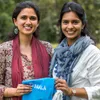How these two men founded a biodegradable sanitary pads startup to start conversations on menstrual hygiene
Hemender Hoon and Ayush Chandel started Noraa, an organic and biodegradable sanitary pads startup in 2019 with an all-women manufacturing unit in Gurugram.
Hemender Hoon was working with an NGO in Kolkata in 2015 when he discovered that menstrual hygiene and awareness was lacking in both rural and urban areas.
“In rural areas, everyone knows that they do not have the luxury of a fancy pad. Even in urban areas, the lack of menstrual awareness was very disconcerting. I never imagined that even in a city like Kolkata, people would not discuss basic hygiene points,” says Hemender.
Hemender co-founded Noraa, an organic and biodegradable sanitary napkin brand with his college friend Ayush Chandel in 2019. Together with an all-woman manufacturing unit, he aims to create an ecosystem for menstrual hygiene to help women have a worry-free period.

Founders of Noraa, Hemender Hoon (L) and Ayush Chandel (R). (Image source: Hemender Hoon)
Wanting to make rash-free periods a reality
After understanding the dire state of menstrual hygiene, Hemender set out to meet the ‘real Padman’, Arunachalam Muruganantham in Chennai on whom the Bollywood movie Padman is based. Hemender got the pad making machine from Arunachalam and the NGO Auro Foundation used it to make Rs 2 cotton pads to distribute in rural areas.
Post his stint with the NGO, Hemender moved to working in the advertising and marketing sector. Conversations with female colleagues at various companies made him realise that women accepted period-rashes as normal.
Hemender says he was perplexed by why women accepted a rash-filled period. Also, he found that most women were not ready to try new products other than the plastic shielded sanitary napkin brands that dominated the market.
This led him to start working on a pad that could be comfortable, rash-free and provide worry-free periods to women.
Making the perfect pad
While working at RL Group, Hemender started to research on pads. He came across an IIT-Hyderabad study that reported that chemicals like dioxin and chlorine were the main causes of UTIs, RTIs, and even cancer, based on personal immune systems and certain findings.
This gave him a further impetus to create a new product that could be safe and comfortable for women.
While other sanitary napkin brands were manufacturing their products in other countries, Hemender wanted to not just design but manufacture the products in India. The search to make the perfect product meant looking for an indigenous pad machine that could bind organic and biodegradable pads. He got in touch with an engineer in UP whose family had been associated with sanitary pad brand Whisper for 10 years. The engineer custom-made a pad machine for Noraa that used processes like thermo-bonding and UV sanitisation.
After procuring the right machine, the search for the right materials and processes led to eight months of R&D which Hemender says is continuous as they receive more feedback from customers. The startup faced several challenges when it came to the product development phase.
One of the foremost challenges was reducing the plastic content in the back-layer or the sticking layer of the pad. Most biodegradable pads use some plastic in this layer to help the pad stick properly. After months of researching, Noraa was able to bring down the plastic content to three percent in the product.
Being a new entrant in the industry, it was difficult to understand the market and brand loyalty in the sector. In the first two months of sales which began in December 2019, Noraa couldn’t reach the targets they set forth. Hemender says that understanding how to build credibility and loyalty was most important to see conversion in terms of customers.
The final product has five layers made of woven-cotton and a cornstarch and sap powder core. The USP of being a rash-free and chemical-free pad, says Hemender, is what differentiates Noraa from other organic and biodegradable pads in the market. Noraa pads start degrading in six months and completely degrade in 24 months.
Being a padman
Hemender says that there were colleagues and family members who were a little averse to him entering the sanitary napkins industry. Some would even suggest new ideas for a business.
However after starting Noraa - which means shining light - he has become a lot more comfortable in the industry.
Noraa began sales in December and even though the pandemic has affected the revenues, Hemender is positive about the future. It currently has a customer base of 2,000 and 100 repeat customers. In March, the startup also received funding of Rs 60 lakh.
With an all-woman manufacturing unit, comprising eight women and a manufacturing capacity of 4 lakh every day, Noraa is working with the philosophy of ‘By women, for women’. The startup also reserves its manufactured pads for employees and their families.
“We don't want Noraa to be a sanitary napkin brand, but to create an ecosystem,” says Hemender. He hopes to introduce allied products like intimate wash, an app, a subscription model and on board gynecologists to help women have a safe and comfortable period. It is also looking to expand to international geographies as well.
Edited by Rekha Balakrishnan









